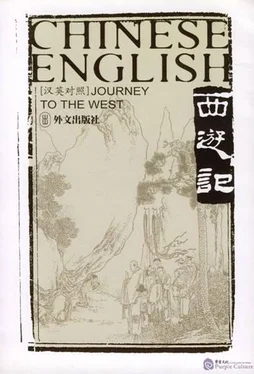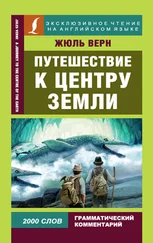“If you won't take gold or silver,” Squire Gao said, “please be good enough to accept these rough clothes as a mark of our gratitude.”
“If we monks accepted a single thread, we would have to atone for it for a thousand ages,” replied Sanzang. “It will suffice if we take the pancakes and fruit that we haven't eaten with us as provisions for the journey.”
“Master, elder brother,” said Pig, who was standing beside them, “it's all right for you two to refuse them, but I was a son-in-law in this family for several years, and I deserves three bushels of grain to take with me. On yes, father-in-law, my tunic was torn by elder brother yesterday and my shoes have split, so please give me a black brocade cassock and a good pair of new shoes.” Old Squire Gao, who could scarcely refuse this request, gave him the new shoes and a tunic in exchange for his old ones.
Pig swaggered over to Old Gao, chanted a “na-a-aw” of respect, and said, “Please inform my mother-in-law, my sisters-in-law, my brothers-in-law, and my uncles that I have become a monk today, and ask them to excuse me for not saying good-bye to them in person. Father-in-law, look after my wife well. If we don't get the scriptures, I'll go back to lay life and work for you as a son-in-law again.”
“Moron,” shouted Monkey, “stop talking nonsense.”
“I'm doing nothing of the sort,” Pig replied, “I am thinking that if things go wrong I'd be wasting my time as a monk, and my wife's marriage would have been ruined, both for nothing.”
“Enough of your idle chatter,” said Sanzang, “let's be on our way at once.” Their luggage was hung from a carrying-pole on pig's shoulders. When the white horse was saddled, Sanzang mounted it, and Monkey led the way with his iron cudgel over his shoulder. Thus the three of them left Squire Gao, his relations, and his friends, and headed West. There is a pome to prove it that goes:
The trees tower above the misty earth
As the Tang disciples of Buddha toil and suffer.
When hungry, they beg their food from a thousand homes;
When cold they wear cloaks with a thousand patches.
Do not allow the Thought-horse to run wild,
And don't let the stubborn Mind-ape howl at will.
With passions stilled and one's nature firm, all destinies are in harmony;
When the full moon of contemplation is reached, you will be pure.
After travelling peacefully Westwards for a month, the three of them left the territory of Stubet and saw a mountain soaring up above their heads. Sanzang stopped whipping his horse on, reined him in, and said, “Monkey, Monkey, that's a high mountain in front of us, so please go and reconnoiter it.”
“No need,” said Pig. “It's called Pagoda Mountain, and there's a Rook's Nest Hermit who cultivates his conduct on it. I've met him.”
“What does he do?” Sanzang asked.
“He has some powers,” Pig replied. “He once invited me to cultivate my conduct with him, but I didn't go.” As master and disciples talked they were soon on the mountain. It was a splendid mountain at that:
South of it were blue pines and verdant locust trees,
To the North were green willows and red peach-blossom.
Cawing noisily,
The wild birds talked to each other;
Soaring gracefully,
The cranes flew together.
Rich in fragrance
Were the thousands of different flowers;
Softly dark
Were the endless kinds of herbs.
In the gullies were bubbling green streams,
The crags were wreathed in auspicious cloud.
It was indeed a scene of rare and elegant beauty.
Lonely, where no man came or went.
As the master surveyed the scene from his horse he noticed a grass hut in front of a fragrant locust tree. To the left of it were David's-deer with flowers in their mouths, and to the right were monkeys holding offerings of fruit, while phoenixes of many colours wheeled around the top of the tree, in which cranes and golden pheasants had gathered. Pig pointed and said, “That's the Rook's Nest Hermit.” Sanzang gave his horse the rein, whipped it on, and went straight to the foot of the tree.
When the hermit saw the three of them coming he jumped down from his bird's nest. Sanzang dismounted and bowed to him, and only then the hermit reply, helping him up, “Please arise, holy priest. I'm sorry I did not welcome you properly.”
“Greetings, venerable hermit,” said Pig.
“Aren't you the Iron-haired Pig from the Mount of Blessing? How have you had the great good fortune of travelling with a holy monk?”
“Last year,” replied Pig, “I was converted by the Bodhisattva Guanyin, and I swore that I'd go with him as his disciple.”
“Wonderful, wonderful,” exclaimed the delighted hermit, who then pointed at Monkey and asked, “Who is this gentleman?”
“Old hermit,” said Monkey, “how is it that you know him but didn't recognize me?”
“Please excuse my ignorance,” the hermit replied.
“He is Sun Wukong, the senior of my disciples,” explained Sanzang.
“I apologize for my discourtesy,” said the hermit.
Sanzang bowed again and asked him the way to the Great Thunder Monastery in the Western Heaven. “Far away,” the other replied, “far away. The journey is a long one and there are many tigers and leopards along the way. It will be difficult.”
“How far is it?” asked Sanzang with great interest. “Although the journey is a long one,” the hermit replied, “you are bound to get there in the end. But there will be evil influences that you'll find hard to dispel. I have a Heart Sutra, a total of 270 words in 54 sentences, and if you recite it when you encounter evil influences you will come to no harm.” Sanzang prostrated himself on the ground and begged the hermit to tell him it, and the hermit recited it to him. It went:
When the Bodhisattva Avalokitesvara was meditating on the profound prajna-paramita, he perceived that all the five aggregates are void and empty, and he was thereupon freed from all sufferings and calamities. Sariputra, matter is not different from voidness and voidness is not different from matter: matter is voidness and voidness is matter. Such is also the case with sensation, perception, discrimination and consciousness. Sariputra, all these things are void in nature, having neither beginning nor end, being neither pure nor impure, and having neither increase nor decrease. Therefore, in voidness there is not matter, no sensation, no perception, no discrimination and no consciousness; there is no eye, no ear, no nose, no tongue, no body and no mind; there is no sight, no sound, no smell, no taste, no touch and no mental process; there is no category of eye nor is there a category of consciousness; no ignorance nor the cessation of ignorance; no old age and death, nor the cessation of old age and death; there is no suffering, no causes of suffering, no cessation of suffering, and no way leading go the cessation of suffering; and there is no wisdom, nor anything to be gained. As nothing is to be gained, a Bodhisattva depending on prajna-paramita becomes free in his mind, and as he is free in his mind he has no fear and is rid of dreamlike thoughts of unreality and enjoys ultimate Nirvana. By mean of prajna-paramita, all Buddhas of the past, the present and the future realize anuttara-samyak-sambodhi. Therefore, we know prajna-paramita is a great, divine spell, a great enlightening spell, a supreme spell, and a spell without a parallel, that can do away with all sufferings without fail. Thus we recite the Prajna-paramita Spell and say: Gate, gate, paragate, parasamgate, bodhi, svaha!
As the Patriarch from the Tang had already the origins of enlightenment inside himself, he was able to remember the Heart Sutra after only one hearing, and it has been passed on down to this very day. This sutra is the kernel of the cultivation of the truth, and it is the gateway to becoming a Buddha. When the hermit had recited it, he started to rise up to his crow's nest by cloud, but Sanzang tugged at him and said that he wanted to know about the way to the Western Heaven. To this the hermit replied with a smile:
Читать дальше









